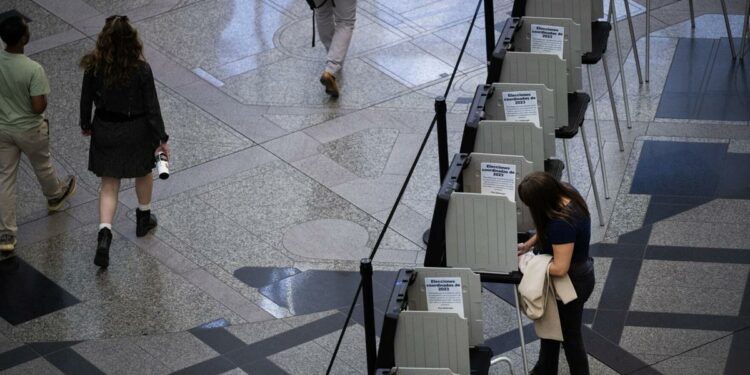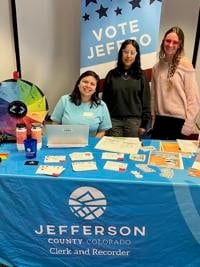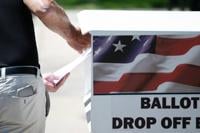MSU Denver Voter Engagement Student Ambassador Madison Larsen with Denver Clerk Paul Lopez at a Valentine’s Day “Vote Your Heart Out” event on campus. (COURTESY: Metropolitan State University)
‘I don’t even want to touch politics’
Arianna Morales, the organizing director for New Era Colorado, which describes itself as a group that seeks to bring “our progressive and diverse generation into the political world,” said there are a number of factors deterring the youth from voting.
Notably, Morales said, young adults often don’t know where to turn for answers to their questions about voting and elections,
Since its creation in 2006, New Era has registered more than 200,000 young people across Colorado through its “Get out the Vote” program on college campuses and in various communities in Denver, Boulder, Colorado Springs and Pueblo.
New Era also publishes voter guides, featuring candidate comparisons and questionnaires.
“We know that first-time voters don’t always have access to that type of information, and that’s typically the barrier or challenge they’ll face to going out and voting,” Morales said. “That’s where we come in to support them so that we can break down those barriers for them and they can participate civically and be able to make informed decisions.”
Larsen and Widger said that, even when people think they’re well-informed about elections and the voting process, the risk always exists that the information they’ve received is inaccurate or false.
According to a study by Pew Research Center, nearly half of all Americans under 30 get their news from social media. While these platforms can offer a quick and engaging way to stay informed on serious topics, they can also facilitate the rapid spread of inaccurate information.Â
Another obstacle for voting advocates when engaging with young people is a lack of interest due to apathy or burnout.
“I think young people feel very disenfranchised by the system. I think there’s a lot of beliefs of, ‘It’s one vote, my vote doesn’t count,'” said Melanie Kesner, Rocky Mountain regional manager at Young Invincibles, an advocacy group that focuses on youth civic engagement.
While many students Larsen encounters on campus are enthusiastic about voting, others don’t want to stay away from politics.
“There are students who are like, ‘I don’t even want to touch politics — the idea is just really gross to me,'” she said.
‘Politics doesn’t have to be that scary, Democrat-versus-Republican thing’
Rowe said she’s encountered similar feelings among her peers at CCU and added that many young people are hesitant to engage in politics due to its increasingly divisive tendencies. Â
“People are afraid of politics because it’s a scary red versus blue argument,” she said. “I think that’s what a lot of media can portray, but through Centennial Institute, I have learned that politics doesn’t have to be that scary, Democrat-versus-Republican thing. There’s so many more things that you actually impact on a local and state level.”
“You have so much impact that you don’t even realize,” Rowe said.
To Widger, it’s important to emphasize how students’ vote can actually make a difference, especially at the local level.
Stay in the know on the stories that affect you the most.
Success! Thank you for subscribing to our newsletter.
“For the students who are kind of turned off to the idea of politics, what we’ve been recently telling them is about how many ballot measures there are gonna be in November,” she said. “Obviously, the presidential election is tumultuous on its own, so just encouraging students to open the ballot at all has been our primary goal, especially because in Denver, they’re expecting it to be like five pages long this year, and there’s such a wide variety of things on the ballot.”
“It’s not just the president, and some students don’t know that there’s more than just the president on the ballot, and that gets them more excited to actually open it, which is our goal,” Widger said.Â
Rowe’s advice to young people who are interested in getting involved politically but aren’t sure where to start is to start small and focus on one policy area or issue that aligns with their interests.Â
“For example, maybe someone is a music education major and there’s a bill being passed about raising salary for teachers in Colorado,” she said. “Find resources that relate to something that you’re passionate about and learn about what’s going on politically, even if it’s just in your county or your city.”
With the average age of a member of Congress nearing 60, Kesner argued that young adults are often left out of the decision-making process, which can lead to feelings of disenfranchisement. However, she argued that young people deciding not to vote because their voices aren’t being heard only perpetuates their lack of influence going forward.
“If people are not voting or people are checking out, their voices are not gonna be represented,” she said. “I think the system’s gonna carry on whether it’s the best system or not, and we have to make sure that young adults know that they do have power an they do have agency, and that their voice does matter.”
Mirna Smith of the Jefferson County Clerk and Recorders office with MSU Voter Engagement Student Ambassadors Melissa Aguilar, center, and Madison Larsen, right. (COURTESY: Metropolitan State University Denver)Â
The primary of nonpartisanship in civic engagementÂ
To show students that politicians do care what they have to say, Metro State launched its Congress to Campus series, featuring former members of Congress from both parties who visit the campus to talk with students.
“Candidates really need to consider young people as a very powerful voting block,” Kesner said.
While it’s commonly assumed that older and younger generations have differing priorities, many political issues that young people cite as their top concerns align closely with those of older voters.
Taxes are one of the biggest concerns for MSU students, who tend to be older than students at other universities in the state. Many of them work full-time jobs besides going to school and taking care of young children or aging parents.
Young voters said they are also concerned about the climate, housing, student debt, and LGBT rights.
“We’ve seen these issues impact young adults regardless of their background or political party,” said Kesner. “Young adults are facing the same thing around the nation.”
While voter engagement programs like MSU’s provide students with information on how to vote and details on candidates, the university’s voter engagement ambassadors are careful to maintain neutrality, ensuring they don’t impart any bias.
“One of the biggest things about our program is staying nonpartisan because I think for a lot of students, it’s kind of hard to get that nonpartisan information because news sources can be super biased,” Larsen said.
While elections are crucial, Kesner said fostering civic engagement among young adults is a year-round endeavor and not limited to election years.
“We really look at voter engagement as a year-round opportunity, and a lot of that comes with helping young adults identify their voice, amplify their voice, learn how to tell their story, speak with elected officials, and make sure that they’re out in the community getting volunteering opportunities,” she said.
Young Invincibles offers two programs to young adults interested in learning more about politics and community activism: Young Advocates, a 12-week leadership development program that brings young adults to the Capitol and involves them in the creation of legislation, and the Youth Advisory Board, which functions similarly to a nonprofit board of directors.
Kesner noted that these programs provide participants with firsthand experience in policymaking and opportunities to meet with elected officials, which makes them feel seen and heard.
“I think when young adults are able to meet their elected officials and understand what their elected officials are actually doing at the state Capitol or at the local level, I think that gives them a role and a space in politics,” she said.
At MSU, voter engagement ambassadors are part of a broader initiative to boost student civic participation. During elections, golf carts drive around campus, promoting voting, handing out free swag, and transporting students to polling locations. The school also hosts a “ballot party” with food, music, and staff available to assist students with filling out their ballots.
The university also has two drop boxes and an in-person polling location on campus and provides day-of voter registration to students who are Denver County residents.
Elizabeth Parmelee, the associate vice president for Undergraduate Studies at MSU who leads the school’s voter engagement initiative, emphasized the importance of students understanding ballot initiatives and local elections, especially those who may be indifferent about voting.
“A lot of our students are beginning to say, ‘Why bother voting? My vote doesn’t make a difference,'” she said. “Yes, in a Presidential election or Senate election, one vote may not make a huge difference, but down ballot, my vote can matter.”
Indeed, a recent legislative race, the victor’s margin was only three votes. Â
Parmelee said she educates young voters that slim margins can win local races.
“We try to make sure they understand if there’s an issue, for example, about real estate taxes. Without telling them our opinions, we try to ensure that they understand what the impact of real estate taxes going up, down, or staying the same has on them, their pocketbooks, and their parents’ pocketbooks,” she said.
THE DENVER GAZETTE
‘Voting is a habit’
While youth voter turnout is higher than in decades, advocates said they won’t stop until it reaches 100%.
“I read somewhere that 18-26 is the biggest voting block, so I think as a younger generation we have a lot of power to make a difference in the voting scene,” Larsen said. “I think it just means a lot and holds a lot of value to know that my opinion actually has value in my society, so I think it’s kind of exciting to vote and to know that my opinion has value and that people are taking it seriously.”
Widger said getting young people in the habit of voting now will mean they will do so for the rest of their lives.
“They’re going to say, ‘Oh, well, I always vote, so I’m just gonna vote again’,” added Widger. “I think that’s really powerful. Voting is the most direct way we can tell our representatives if they’re doing a good job or not, and the most direct way we can have an impact on our communities.”
For Imer, it’s about proving something to the older generations. Adults are skeptical of his abilities due to his young age, he said. Â
“They think because you’re the young kid, you don’t know anything, so they decide they aren’t gonna listen to you, even though you may be the most opportune person in the room to address the cause at hand or the issue at hand,” he said. “We’re immediately discounted because of our age and this assumption that we just want free healthcare and free stuff all the time, and that’s not the case.”
By showing up at the ballot box, Imer said, young people “will be shown to be who we’ve said we are, which is educated, smart individuals that just want a future that is not bogged down by high costs and inflation and the risk of never being able to own a home.”
“I think it also proves to the older generations that they can trust us, and that they don’t have to worry that their country is gonna get left behind because we aren’t engaged,” Imer said.Â
Source link : http://www.bing.com/news/apiclick.aspx?ref=FexRss&aid=&tid=66c28d3f7f7b4231a32b5e897e7ddb87&url=https%3A%2F%2Fgazette.com%2Fcolorado_politics%2Fyoung-voters-civic-engagement%2Farticle_2f709201-34ca-5b09-8569-f7812011d9f9.html&c=10655598680531165215&mkt=en-us
Author :
Publish date : 2024-08-11 21:30:00
Copyright for syndicated content belongs to the linked Source.
















